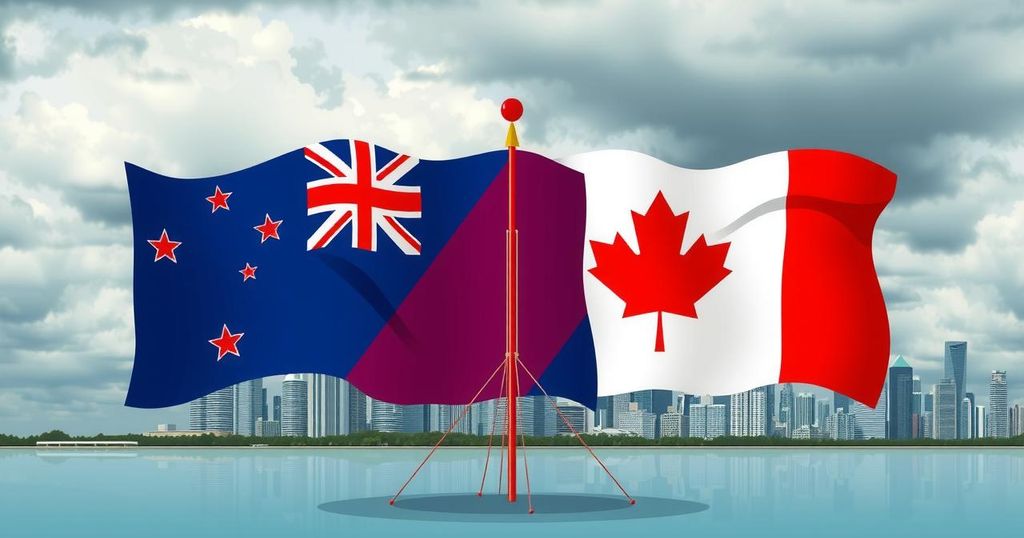World news
AMERICA, ASIA, AUSTRALIA, BEN WELLINGS, CANADA, CANADIAN LIBERAL PARTY, CLAYTON, CLAYTON CHIN, COALITION, CUBA, DONALD TRUMP, DUTTON, ELECTION, GOVERNMENT, IMMIGRATION POLICY, JAPAN, JUSTIN TRUDEAU, LABOR, LIBERAL PARTY, MARK CARNEY, MELBOURNE, MONASH UNIVERSITY, NORTH AMERICA, OCEANIA, PETER DUTTON, PIERRE POILIEVRE, POILIEVRE, POLITICS, POPULISM, TRUDEAU, TRUMP, UNIVERSITY, US, USA
Michael Grant
0 Comments
The Impact of Trump’s Political Shadow on Australian and Canadian Elections
The upcoming elections in Canada and Australia are significantly influenced by the declining popularity of conservative parties, largely attributed to the ramifications of Donald Trump’s administration. Polling trends reflect a dramatic shift, with conservative leaders struggling to regain support amidst growing anti-Trump sentiment, framing a complex electoral landscape in both nations.
In the impending elections, Canadian and Australian voters are positioned to make significant electoral choices amidst changing dynamics. Initially, conservative parties in both nations were projected to secure victories. However, recent polling indicates a marked decline in support for the leading conservative candidates, placing them behind the incumbent centre-left parties.
Ben Wellings, a senior lecturer at Monash University, noted the simultaneous electoral proceedings in Canada and Australia could reveal broader trends. He pointed out that the decline in poll numbers for the Conservative party in Canada and the Liberal party in Australia might reflect the challenges posed by Donald Trump’s political legacy, which has not yielded universal benefits for right-leaning candidates.
Both nations experienced notable shifts in polling since the start of 2023, particularly following Trump’s inauguration and his initiation of trade hostilities against allied countries. In Australia, the Coalition had seen an upward trend in polling until February, but a rapid decline ensued post-Trump’s administration. Conversely, Canadian Conservatives faced a similar fate, transitioning from a robust lead to trailing the Liberal Party since the onset of Trump’s trade war, which galvanized support for Prime Minister Justin Trudeau’s government.
As Trudeau stepped aside, new Prime Minister Mark Carney persisted with a combative stance towards Trump, which further elevated Liberal popularity. Clayton Chin from Melbourne University emphasized that questioning national sovereignty or the essence of statehood profoundly influenced the electoral climate. He observed that Pierre Poilievre, the Conservative leader, struggled to effectively adapt to these evolving dynamics.
Peter Dutton, the Australian Opposition Leader, faced backlash for his favorable remarks regarding Trump, particularly regarding plans for Gaza. Dutton’s appointment of Senator Jacinta Price, alongside her remarks reminiscent of Trump’s slogans, further solidified this connection. Dr. Chin remarked that elements within both parties are sympathetic to Trump’s political style and policies.
While Antony Green of the ABC recognized parallels in Trump’s influence on the campaigns, he indicated that the effects should not be overstated. He noted that while the Coalition initially gained from populist appeals, the Liberal Party adjusted its stance away from such alignments recently. In Canada, the stakes are perceived as more immediate due to heightened tariffs and rhetoric surrounding sovereignty.
Public sentiment in Australia reflects skepticism towards the Trump administration, with recent polls indicating that many undecided voters are disinclined to support Dutton due to Trump’s influence. Surveys, including one from Resolve Monitor, indicate that a significant number of Australians harbor distrust towards the United States. Various citizen comments collected indicate a growing desire for leadership that resonates with Canada’s firm stance against Trump.
Dr. Chin highlighted shared sentiments in both Australia and Canada regarding perceived betrayals by the United States, stemming from longstanding diplomatic ties. He encapsulated the prevailing perspective of dissatisfaction and disappointment with U.S. leadership under Trump, underscoring the unique complexities faced by conservative candidates in both elections.
As the elections approach, speculation continues regarding potential outcomes, with some analysts warning of unforeseen election day surprises. In Canada, reactions to the Conservative party’s campaign performance have already commenced, with critiques regarding their inability to maintain a substantial lead. Green emphasized that the current dramatic shifts in polling could likely be attributed to Trump’s controversial actions and their reverberating effects.
In summary, the shadows cast by Donald Trump’s political actions loom over forthcoming elections in Australia and Canada, potentially altering the trajectories of conservative parties in both nations. Polling data reveal significant declines in support for opposition candidates, likely influenced by Trump’s policies and controversial leadership style. The evolving sentiment among voters underscores a broader discontent with the U.S., suggesting that both countries are navigating complex relationships with their longtime ally. As election day approaches, observers remain vigilant for potential unexpected outcomes.
Original Source: www.abc.net.au




Post Comment